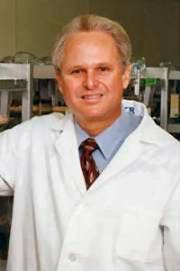|
Understanding Human Aging
Health and Aging at the Molecular Level
EMBS - Life Member Affinity Group Event
Stephen Spindler PhD

September 27, 2006
CLU - Richter Hall Ahmanson Science Building
The rate of animal aging is strongly influenced by diet. The more calories consumed, the faster it ages. Well-fed animals not only age faster, they have higher mortality from cancer, heart disease, and diabetes. And the reverse is true, the fewer calories eaten (provided malnutrition is avoided) the slower an animal ages, the lower the death rate from cancer, and the lower the rate of heart disease and diabetes. The positive relationship between caloric restriction, health and longevity has been found from mammals to insects to worms. However, this picture is not as clear in older animals.
Stephen Spindler
UC Riverside
 Dr. Spindler is a Professor of Biochemistry and Chairman of the Department of Biochemistry at the University of California, Riverside. He is also Chief Scientific Officer of Echelon Biosciences (formerly Life Extension Genetics). He earned his B.S. in Biology at UCSD in 1970 and his Ph.D. in Biomedical Sciences with a focus in Biochemistry at the University of Texas Graduate School of Biomedical Sciences 1976. He performed Postdoctoral studies on RNA polymerase structure and function in the Department of Biochemistry at Colorado State University (1976-1977), and studied the hormonal regulation of gene transcription in the Endocrine Research Division of the UCSF (1977-1981). In 1981 he joined the faculty at the UCR. Dr. Spindler is a Professor of Biochemistry and Chairman of the Department of Biochemistry at the University of California, Riverside. He is also Chief Scientific Officer of Echelon Biosciences (formerly Life Extension Genetics). He earned his B.S. in Biology at UCSD in 1970 and his Ph.D. in Biomedical Sciences with a focus in Biochemistry at the University of Texas Graduate School of Biomedical Sciences 1976. He performed Postdoctoral studies on RNA polymerase structure and function in the Department of Biochemistry at Colorado State University (1976-1977), and studied the hormonal regulation of gene transcription in the Endocrine Research Division of the UCSF (1977-1981). In 1981 he joined the faculty at the UCR.
|


 Dr. Spindler is a Professor of Biochemistry and Chairman of the Department of Biochemistry at the University of California, Riverside. He is also Chief Scientific Officer of Echelon Biosciences (formerly Life Extension Genetics). He earned his B.S. in Biology at UCSD in 1970 and his Ph.D. in Biomedical Sciences with a focus in Biochemistry at the University of Texas Graduate School of Biomedical Sciences 1976. He performed Postdoctoral studies on RNA polymerase structure and function in the Department of Biochemistry at Colorado State University (1976-1977), and studied the hormonal regulation of gene transcription in the Endocrine Research Division of the UCSF (1977-1981). In 1981 he joined the faculty at the UCR.
Dr. Spindler is a Professor of Biochemistry and Chairman of the Department of Biochemistry at the University of California, Riverside. He is also Chief Scientific Officer of Echelon Biosciences (formerly Life Extension Genetics). He earned his B.S. in Biology at UCSD in 1970 and his Ph.D. in Biomedical Sciences with a focus in Biochemistry at the University of Texas Graduate School of Biomedical Sciences 1976. He performed Postdoctoral studies on RNA polymerase structure and function in the Department of Biochemistry at Colorado State University (1976-1977), and studied the hormonal regulation of gene transcription in the Endocrine Research Division of the UCSF (1977-1981). In 1981 he joined the faculty at the UCR.